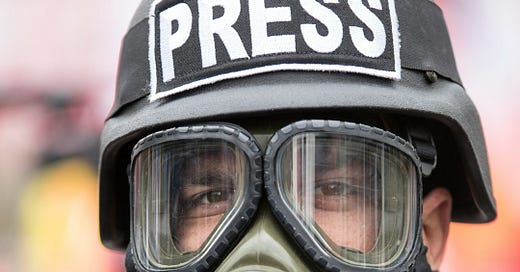Why opinion journalists are the first casualties of the war on the press
Donald Trump's media enablers and sycophants have used journalism's own confused conventions to suppress their most troublesome critics.
“Yeah? Well, you know, that’s just, like, uh, your opinion, man.” — The Dude
Within days of my defection from the relatively respectable ranks of real reporters to the editorial board of a New Jersey newspaper, a young news side colleague I thought I was friendly with greeted me by sneering that I had come to “shoot the wounded.” He was recycling a threadbare gibe to the effect that it’s only after all the journalistic warfare is done — presumably by the aforementioned real reporters — that opinion writers emerge from their hidey-holes to make a show of triumphantly dispatching those enemies barely clinging to life.
As a critique, it did have the virtue of being funnier than the one leveled by a former fellow reporter, who told me that crossing over to the opinion side was just “evil.”
My point is that opinion journalism is a nettlesome pursuit, even among journalists themselves. That’s why newspaper editors have for so long anxiously over-labeled anything produced by their opinion departments and made much of their separation from news departments by a “firewall” — the sort of handling normally reserved for poisonous compounds or malicious software.
This internal discomfort with overt points of view has only encouraged outsiders with ulterior motives to silence unwanted criticism by targeting opinion journalists in general, most recently in a concerted campaign by media moguls currying favor with the Trump administration. It’s already had real repercussions for the mainstream press’ capacity to call out the president’s worst excesses, as evidenced by the Los Angeles Times’ unprecedented incapacity to editorialize against the federal attack on its city.
Now that this trend has forced me, five editorial boards later, to immolate my own career as an opinion journalist, I can offer a full-throated defense of what my former profession provided without seeming to be merely talking my book.
Although readers and writers often mistake objectivity for a moral or ethical ideal, commercial concerns fueled its rise as a journalistic norm. Starting in the late 19th century, newspaper publishers’ desire to maximize readership and minimize offense to advertisers made the press’ former partisanship unpalatable because it was unprofitable.
To this day, news and opinion editors alike tend to overemphasize that their editorial writers and columnists do their own reporting, cover rapidly developing stories and even break news — almost as if trying to render them so indistinguishable from reporters that they might inoffensively blend in. The corrosive subtext is that journalism that goes beyond fact-finding and sheds the posture of objectivity is inherently inferior and suspect.
I’ve respected and relied on news reporters and editors for years; in fact, like a lot of opinion journalists, I used to be one of them, which is the best way to learn how hard the job is to do well. Especially under a regime engaged in a relentless assault on the truth, the value of gathering and submitting facts to the world is difficult to overstate.
And yet opinion pieces often provoke more uproar and force more change than the corresponding news stories. An editorial or column may be impossible without the reporting that preceded it, but the power of an independent conclusion based on those facts can be undeniable. An exhaustive report on an elected official’s misdeeds is one thing; an endorsement of her opponent is another.
That’s why, when the Philadelphia Inquirer’s 2009 bankruptcy opened the door to hedge funds and then a consortium of power brokers, some of their first moves were to diminish and downplay the opinion section. For the vulture capitalists, opinion was an unnecessary risk to their riches; for the political bosses, it was a dangerous challenge to their dominance.
It’s a pattern that has reiterated and escalated as the increasingly weakened legacy media has turned tail from endorsements in particular and opinion journalism in general.
It turns out that Jeff Bezos, for example, was only getting warmed up when he killed the Washington Post’s Kamala Harris endorsement. He has since presided over a hemorrhaging of journalists from the publication’s storied opinion section, sought to strictly limit the views allowed therein, and reportedly developed a plan to transform it into a glorified wholesale aggregator of all manner of outside commentators edited by artificial intelligence.
The Los Angeles Times’ Patrick Soon-Shiong, recently seen proudly hobnobbing with a despot believed to have approved the murder of an opinion journalist, likewise graduated from killing a couple of editorials to disappearing the publication’s editorial board. While the Trump administration’s frightening military incursion into my hometown has yielded fine news coverage and opinion pieces from the Times — if you can unearth them from their deliberately obscure corners of its website — Soon-Shiong’s service has ensured that it hasn’t and probably won’t produce anything so forceful as an institutional editorial objection to the authoritarian assault on L.A.
In orchestrating this capitulation to the regime, Soon-Shiong, Bezos and company are using the confused jargon of journalistic objectivity against their own journalists as they both-sides the independent press into oblivion.






When journalism is controlled and censored we keep going down a very dark path! Keep a light shinning doing your good work as an independent.